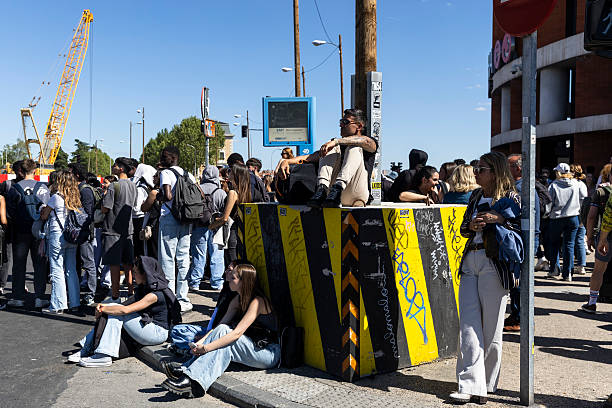Massive Blackout Brings Spain and Portugal to a Standstill
A massive power outage brought Spain and Portugal to a standstill, disrupting transportation, phone services, and daily life for millions of people across the Iberian Peninsula.
 Widespread Power Outage In Spain And Portugal Photo (@Getty Images)
Widespread Power Outage In Spain And Portugal Photo (@Getty Images)A widespread power outage brought much of Spain and Portugal to a standstill on Monday, causing widespread disruptions to transportation, phone services, and daily life. The blackout, which began at midday, affected millions of people across the Iberian Peninsula, stopping trains, shutting down traffic lights, and disabling ATMs.
Spanish power distributor Red Eléctrica said restoring power fully could take six to 10 hours, with Head of Operations Eduardo Prieto describing the event as "exceptional and extraordinary". Spanish Prime Minister Pedro Sánchez attributed the outage to a "strong oscillation" in the European grid, but said the cause was still being determined. He urged the public to refrain from speculation and limit calls to emergency services to only those absolutely necessary.
The outage had a significant impact on transportation, with train services halted and subway systems shut down in both countries. Spain's Transportation Minister Oscar Puente said it wouldn't be possible to restart trains later Monday even if power returned. Airports were affected, with Spanish airports operating on backup electrical systems and some flights delayed. In Lisbon, terminals closed, and tourists waited outside for news about flights.
Hospitals and emergency services switched to generators, while gas stations stopped working. Mobile phone networks were also affected, making it impossible to make calls on some networks, although some apps were still working. People searched for battery-powered radios to stay informed.
The Portuguese National Cybersecurity Center said there was no indication the outage was due to a cyberattack, a view shared by Teresa Ribera, European Commission executive vice president in charge of promoting clean energy. She described the power outage as "one of the most serious episodes recorded in Europe in recent times".
Spain's Prime Minister convened an extraordinary meeting of the National Security Council, while the Portuguese Cabinet convened an emergency meeting at the prime minister's residence. Portugal's government said the outage appeared to stem from problems outside the country. Electricity was being pulled from Morocco and France to restore power to southern and northern Spain, with Spain also increasing production from hydroelectric and combined cycle thermal power plants.
As the situation unfolded, people took to the streets, with some civilians in Barcelona directing traffic. In Barcelona's streets, throngs of people milled in front of darkened stores, exchanging information and trying to make sense of the situation. Some took advantage of the lack of connectivity to enjoy the sunshine on restaurant terraces, parks, and beaches.
The impact on daily life was significant, with offices closed, and traffic snarled in Madrid and Lisbon. Some people got trapped in the metro, while others were stuck in elevators. Courts stopped work, and ATMs and electronic payment systems were affected. Stores selling generators were out of stock in some areas. People were unable to reach loved ones due to phone network disruptions.
Portugal's National Authority for Emergencies and Civil Protection said backup power systems were operating. The Portuguese government placed more police officers on duty to cope with increased requests for help. Several Lisbon subway cars were evacuated.







Conversation